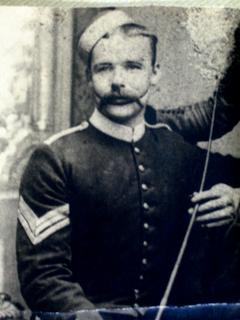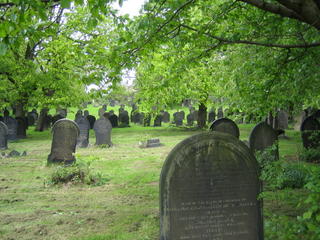Sunday visits to dad
 John Wildgoose, Walter's father, had to live out his days in the Firvale Infirmary after suffering the sunstroke that invalided him out of the army. The Firvale Infirmary was a part of the Sheffield Union Workhouse in the Pitsmoor area of Sheffield. The census lists him as "pauper."
John Wildgoose, Walter's father, had to live out his days in the Firvale Infirmary after suffering the sunstroke that invalided him out of the army. The Firvale Infirmary was a part of the Sheffield Union Workhouse in the Pitsmoor area of Sheffield. The census lists him as "pauper."As mentioned in yesterday's post, the Sheffield Union Children's Homes was also a part of the workhouse. Though many of the homes were scattered around the city, Walter, Bert and Harry lived in Ivy Cottage on the workhouse grounds and in close proximity to the infirmary where their father lived. Interestingly, the boys only visited their dad on Sundays. Here's Walter's account of the visit routine:
Poor Dad! In that infirmary with his arm and leg paralysed through sunstroke in India. He was invalided out of the army, and he brought us all home from India, and stayed with Grandmother in Aldershot until arrangements were made for us to go to Sheffield. Brother Fred went back to Folkestone with my mother after leaving Harry, Bert, and I at Aldershot. Sister Annie was sent to the Girls Home in Witley Bay in Northumberland, and I never seen her again until I was due to go to Aden in 1911, fifteen years afterwards. She was in service as House Parlour Maid in Lancaster Gate, and she stayed there until she met Charles Bissell, a milkman, in Richmond.
When Walter was about to leave school (and on his way to the training ships), his father gave him a little advice:
The time was drawing towards leaving school, and we went to see Father the following Sunday and told him about our new life that was opening out for us. I told him I would like to go to sea, and he told me, “It is your life, Boy. I cannot help you, but take my advice – never let the nails in your boots go rusty.” And I realized what he meant.

But according to Walter he wasn't very close to his father:
My poor Father passed away in February 1905. My mother came from Folkestone to pay her last respects. He was interred in Burngreave Cemetery Sheffield, his hometown. He was a Sheffielder, and all his relatives lived there. I couldn’t mourn the loss, as I didn’t know Dad all that much as I did not have any family life, nor did Bert or my sister Annie. Harry had already run away from the Home, and I never seen him again. He would be 94 years of age if he’s still alive. We became a bunch of “happy wanderers.”
I do wonder about the exact nature of John's medical condition - was it just physical or was there a loss of mental capacity as well (which can happen with sunstroke)? I have a copy of his death certificate, but it doesn't mention specifics on this.

0 Comments:
Post a Comment
Subscribe to Post Comments [Atom]
<< Home